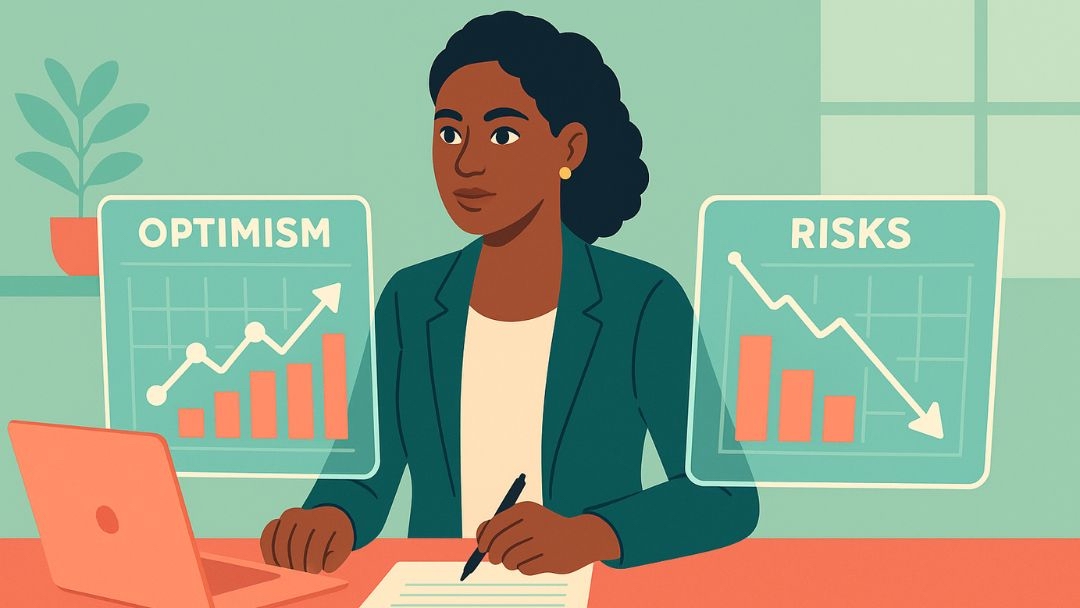How Moderate Neuroticism Influences Entrepreneurial Style: Big 5 Theory
Entrepreneurs with moderate Neuroticism experience emotions deeply without being overwhelmed by them. This article explores how that emotional range influences their entrepreneurial style.


Back
7 mins read
Entrepreneurship often demands emotional strength, but that doesn’t mean shutting feelings down. With moderate Neuroticism, entrepreneurs can stay alert to challenges without being overwhelmed.
Possessing a balance of emotions can be incredibly beneficial in various circumstances, and people scoring moderate on neuroticism are neither overanxious nor extremely calm. That is why they can stay flexible enough to handle different situations. Let’s explore how this balanced trait influences business behavior and success.
You may also want to read:
- How Does High Neuroticism Impact Entrepreneurial Style?
- How Does Low Neuroticism Impact Entrepreneurial Style?
- Best Jobs and Careers for Neuroticism Personality Traits
- Big 5 Neuroticism vs. Emotional Stability: How Do These Traits Impact Learning Styles?
- Neuroticism vs. Emotional Stability and Leadership Style: Strengths and Communication Styles
- Big 5 Neuroticism vs. Emotional Stability Relationship Styles
How Does a Moderate Neuroticism Score Impact Entrepreneurial Style?

You should understand that moderate and high neuroticism scores differ enormously. Those with high neuroticism scores have a 14-fold increased risk of developing depression and a 7-fold risk of developing anxiety disorders compared to people with moderate neuroticism scores.
In addition, entrepreneurs with an average level of neuroticism have the ideal balance when it comes to risk-taking. Unlike those who score extremely low and recklessly throw themselves into high-risk ventures or are too anxious due to their high scores, they can calmly assess opportunities before jumping in — an invaluable asset for making intelligent business decisions.
This emotional detachment allows them to evaluate potential rewards against any possible risks without being swayed by either fear or impulsiveness.
The world of entrepreneurship is well-acquainted with stress. People with moderate neuroticism are in an advantageous position here as they understand the difficulties associated with their entrepreneurial journey and remain confident that they can tackle them successfully. While they may not be as stress-resistant as entrepreneurs with low neuroticism, they still have significantly lower chances of failing in business than highly neurotic people, especially in innovative industries.
Tips for Achieving Success with Moderate Neuroticism as an Entrepreneur

The moderate score on neuroticism gives entrepreneurs unique advantages but also requires thoughtful strategies to overcome potential challenges that come their way.
Here are some tips for entrepreneurs with this moderate score to leverage their strengths and navigate potential issues.
Embrace Your Balanced Perspective:
Having a moderate level of neuroticism can be incredibly beneficial, as it grants the ability to observe situations from different emotional angles and be mentally strong. This balanced perspective allows for better decision-making, as you can weigh the pros and cons from a passionate and calm standpoint.
Prepare for Uncertainty:
Navigating the entrepreneurial path is no simple task, as it's filled with unexpected twists and turns. Possessing balanced neuroticism will serve you well in most circumstances, as you won’t worry too much about the future. However, having a backup plan can be invaluable. This proactive approach helps to tackle potential issues directly while also providing a sense of relief and security for those involved.
Understand Your Triggers:
With an average neuroticism score, certain topics or events may trigger a more intense response than others. It's beneficial to identify and comprehend these triggers to navigate them proficiently so they won’t affect your entrepreneurial effectiveness.
Delegate When Necessary:
Moderate neuroticism makes you well-suited for performing various tasks, but it doesn't necessarily mean you must take on every problem solo. So remember to delegate tasks, as others may perform them more effectively. Plus, by doing so, you can prevent stress and burnout.
Reevaluate Goals Often:
Periodically assessing your objectives is an essential part of the ever-changing entrepreneurial experience. Your moderate neuroticism can be a great asset here, helping you achieve a harmonious balance between ambition and practicality.
To wrap up, those with a moderate score on neuroticism have balanced emotional stability. They can use their emotional balance to build strong relationships, make wise choices, and lead their business venture energetically while being mindful of practical considerations.
Cons of Having Moderate Neuroticism as an Entrepreneur

Despite the advantages of having a moderate level of neuroticism that provides an even-handed perspective in many scenarios, entrepreneurs must also consider its potential drawbacks.
Let's take a closer look at some of these challenges:
Fluctuating Energy Levels:
The ups and downs of having a moderate degree of neuroticism can lead to times when one is full of life and enthusiasm, as well as periods in which they feel sluggish or disinterested. This can affect their productivity.
Paradox of Choice:
Having balanced emotional stability can be advantageous, as it allows for consideration of multiple points of view. This is certainly an asset in most scenarios. However, when quick decision-making is required, entrepreneurs with moderate neuroticism may require more time to analyze all the options they have.
Potential Stagnation:
Maintaining emotional stability can often lead to a state of comfort and security. However, if no strong external forces are driving us in one direction or another, we may become too passive with the status quo.
Issues With Passion-Driven Ventures:
It can be difficult for those with a more moderate emotional approach to succeed in industries or endeavors fueled by passion and enthusiasm. So, it can be more difficult for entrepreneurs with moderate neuroticism levels to be creative and dive into risky ventures.
Ambiguity in Leadership Style:
Maintaining a clear and consistent leadership style can be quite challenging for people with moderate neuroticism. Depending on the circumstances, they may shift between emotionally guided and analytically oriented methods.
Entrepreneurs with moderate neuroticism are generally balanced in their emotional reactions. Despite its clear benefits, moderate neuroticism can bring difficulties, too, and you will have to consider them if you want to be more than "average."
Famous Entrepreneurs with Moderate Neuroticism

Most well-known entrepreneurs are usually on the extremes of the neuroticism spectrum. However, we've found a few examples of entrepreneurs who show balanced emotional responses that may be indicative of moderate neuroticism:
Cher Wang:
As the co-founder and chairperson of HTC Corporation, Wang has been a driving force in the tech industry. Her knack for innovation and ability to adapt quickly has enabled her to stand out from her peers. She consistently presents herself as level-headed and forward-thinking during public appearances. While HTC is not the most innovative company, it has its market share and loyal customers.
Brian Armstrong:
Brian Armstrong, CEO of Coinbase, has struck a delicate balance between ambition and realism in his approach to the ever-changing cryptocurrency landscape. He brings both enthusiasm for progress and an analytical mindset backed by data to every decision he makes.
Ben Silbermann:
As the co-founder and CEO of Pinterest, Silbermann stands out among other tech CEOs with his more balanced approach to leadership. While Pinterest has never been as popular as Instagram or Facebook, it performs well with hundreds of thousands of loyal users.
Kiran Mazumdar-Shaw:
As chairperson and managing director of Biocon Limited, one of India's most esteemed biopharmaceutical companies, Kiran Mazumdar-Shaw has exhibited balanced leadership. Her visionary approach to biotech and nuanced understanding of global markets has been instrumental in catapulting this organization into a successful enterprise.
Nolan Bushnell:
As the founder of Atari, Bushnell has demonstrated a remarkable ability to innovate in the leisure and entertainment industry. His decisions are carefully calculated, effectively balancing creative exploration and market assessment for optimal success.
Chad Hurley:
One of YouTube's co-founders, Chad Hurley, was a pioneer in ushering in an era when online video platforms have become commonplace. His foresight and ability to adapt quickly made him successful in this area. Since then, he has continued to demonstrate a balanced approach toward entrepreneurship, as seen through subsequent ventures.
Mark Cuban:
Mark Cuban is a renowned entrepreneur who has created multiple ventures and gained further recognition through his involvement in Shark Tank. With an intuitive yet strategic approach to decision-making, he's crafted a balanced portfolio that encompasses both risk-taking opportunities and safe investments.
While the entrepreneurs mentioned above may not be as famous as their low or high-neuroticism colleagues, they still achieve significant success in various industries by using a balanced approach to business.
Moderate Neuroticism Businesses and Industries

Those with moderate neuroticism possess a unique balance of emotional sensitivity and stability, making them well-suited to various businesses. Let's explore the industries where entrepreneurs with moderate neuroticism might perform better:
Mediation and Conflict Resolution:
Entrepreneurs in this field must possess a sharp understanding of the emotional undertones present while staying neutral and impartial throughout any conversation. It takes an ideal balance between being sensitive to people's feelings and having enough detachment to maintain objectivity. Moderate neuroticism allows for both empathy and objectivity when needed most.
Retail Business:
A moderate level of neuroticism can be a major boon when it comes to customer service and navigating the everyday obstacles associated with retail. Being mindful of emotions enables us to address customers' queries more effectively, accurately track inventory, and run operations smoothly.
Finance and Investment:
Exhibiting a moderate level of neuroticism can be advantageous in financial planning and decision-making. This balance allows individuals to consider risks rather than being overwhelmed by them or taking impulsive actions based on emotions alone.
Tech Startups:
The tech startup space is known for its high-speed and ever-changing environment, so having the ability to think rationally and innovatively at the same time can be extremely valuable. Plus, entrepreneurs with balanced neuroticism will likely react positively to criticism and adjust their business strategies based on feedback.
Hospitality:
As a restaurateur, cafe owner, or bed-and-breakfast proprietor, it is essential to prioritize customer satisfaction and operational efficiency. It could be argued that having some degree of neuroticism can actually help entrepreneurs remain vigilant in their pursuit of high-quality service and address any issues before they arise.
Legal Services:
Navigating the legal world necessitates paying meticulous attention to detail, alongside having the emotional intelligence to address clients' personal and sensitive matters. Having a healthy level of neuroticism can be beneficial in maintaining concentration on the intricacies of law while still being able to empathize with customers.
Logistics and Supply Chain Management:
Keeping deliveries on schedule, overseeing storage facilities, and streamlining transportation all require a careful yet composed attitude — traits typically associated with those who exhibit moderate levels of neuroticism.
Balance doesn’t always grab attention, but it can become your greatest asset in business. Entrepreneurs with moderate Neuroticism often move forward with awareness and control. By staying emotionally responsive without being overwhelmed, they’re able to lead with steady confidence and achieve success.


Return to Blog






